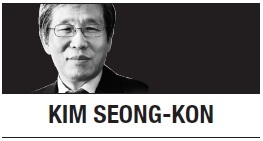 Generally speaking, Koreans like to belong somewhere and tend to flock together. Perhaps that is why there are so many groups, societies and associations in Korean society.
Generally speaking, Koreans like to belong somewhere and tend to flock together. Perhaps that is why there are so many groups, societies and associations in Korean society. Koreans seem to feel comfortable and gain strength when they belong to a group. There seems no place for lone wolves in Korean society. Unless you belong to a group, you will be a social pariah like a stray dog or an alley cat.
Of course, not everybody is the same. There are black sheep even in the Korean community. I, for example, have never belonged to a literary group or faction. I have always wanted to be as free as a bird, whether ideologically or politically. Perhaps I could have gained more power and support if I had belonged to a particular faction. But why would I need power and support? Surely, that is against my free spirit. I left home and my hometown when I was 12, and have lived freely and independently ever since.
Besides, my mentors, Leslie Fiedler and Edward Said, taught me not to join any literary faction. “If you join a literary school or faction and thus categorize yourself,” they used to tell me, “you’ll never be able to be a great person.” I know I am not a great man even though I do not belong to any group, and yet I still like to be autonomous and independent. I am not afraid of being alone either.
As a writer, I am inclined to be a left intellectual because an intellectual is supposed to take side of the underprivileged and the alienated. As a man who completed secondary and college education in the 1960s, I am a natural-born liberal showered by the spirit of the 1960s. But I am neither a Marxist nor a socialist. Although capitalism has shown serious inherent problems and we may need an alternative system in the future, I still have faith in capitalism, which transformed Korea into an affluent society from a hopelessly poverty-ridden postwar country.
Therefore, I am neither a leftist nor a rightist. I guess that makes me a colorless man. At the same time, however, I think of myself as a colorful man as well, because standing in the middle, I can embrace both extremes and absorb all the colors in between. Living in a gray zone between colors from the opposite ends of the spectrum, I have always been striving for a rainbow coalition.
That is why I have chosen to be a postmodernist who can embrace differences and transcend boundaries. As a postmodernist, I do not believe in the absolute truth, the sacred center, or rigid boundaries. As a postmodernist, I embrace both highbrow culture and middlebrow culture, or serious literature and popular literature, thereby trying to fulfill what Herman Melville writes in “Moby-Dick”: “colorless of all colors.”
While working at the Literature Translation Institute of Korea, therefore, I have never categorized a writer according to his or her literary group or ideological faction. I am not interested in such trivial matters at all. I have helped writers gain international recognition as long as they are competent and popular overseas. I did not care if he or she was a leftist or a rightist. Besides, I have always thought that literature should be free from political interference. That is why from 2014 to 2016, I had LTI Korea support 686 projects involved with 101 writers whose names were on the so-called government blacklist.
However, it would not be right if a writer harshly criticized his government on foreign soil while traveling on a government fund. By the same token, it would be weird to apply for a government grant for a project designed to criticize the government. Strangely, however, we do not seem to perceive it as a contradiction. People in other countries are different from us. For example, American writers would be reluctant to accept traveling expenses from Washington in a similar situation. When a Korean institution tries to invite American writers to Korea, they almost always want to know if it is a government-subsidized project with political undertones. If it is, they are reluctant to come.
If a country is divided sharply by two extremes, it will inevitably end up being a black and white society where people perceive everything as right or wrong, true or false, and justice or injustice. If so, it will never be a colorful society that can embrace different colors. In such a monochromatic society, people will insist they are the only ones who are politically right and morally superior. Then hatred, personal vendetta and hostility will be prevalent.
Sometimes, I think that in Korean society, which is unfortunately divided by black and white or red and blue, a colorless man can be a colorful man because he can embrace different colors and accomplish the rainbow coalition. We need to overcome the black and white polarity in order to build a truly colorful society.
By Kim Seong-kon
Kim Seong-kon is a professor emeritus of English at Seoul National University and president of the Literature Translation Institute of Korea. He can be reached at sukim@snu.ac.kr. -- Ed.


![[Exclusive] Korean military set to ban iPhones over 'security' concerns](http://res.heraldm.com/phpwas/restmb_idxmake.php?idx=644&simg=/content/image/2024/04/23/20240423050599_0.jpg&u=20240423183955)




![[Pressure points] Leggings in public: Fashion statement or social faux pas?](http://res.heraldm.com/phpwas/restmb_idxmake.php?idx=644&simg=/content/image/2024/04/23/20240423050669_0.jpg&u=)

![[Herald Interview] 'Amid aging population, Korea to invite more young professionals from overseas'](http://res.heraldm.com/phpwas/restmb_idxmake.php?idx=644&simg=/content/image/2024/04/24/20240424050844_0.jpg&u=20240424200058)








